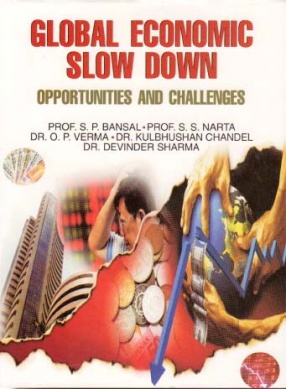Global Economic Slow Down: Opprtunities and Challenges (In 2 Volumes)
Amongst all initiatives to uplift the economies of the nations world wide globalization has been taken as the initiative of first priority. The concept of globalization has been taken by the countries in different perspectives. It is however accepted that globalization is to make a new path in the form of regulatory framework with the intention to improve and to make accessibility of goods, services exchanges and people for the development and growth of industry, employment education, communication technology infrastructure capital flow and other socio-economic segments for the purpose of a change in quality of life, culture, national economy and the world as well to concentrate upon spreading of the national boundaries to a global village. The book Global Economic Slow Down: Opportunities and Challenges in Asian Countries, is a modest attempt in this direction. The book aims to focus mainly upon the related areas which have been influenced due to the global economic slow down. These are:
Globalization and economic melt down.
Work life balance and corporate Governance in globalization era.
Tourism Industry and economic slow down.
Implications of global crisis on financial markets.
Globalization has been encouraged by the countries through regulatory initiatives. In India, in the year 1991, reforms were made for globalization. The book endows to analyze whether globalization has been proved a boon or bane in context to different socio-economic considerations. Developed countries, still have an edge upon the economies of the nations. In fact, these countries dominate the economies of other under developed nations in Asia and South Africa. Through globalization countries have tried to sort out the solution of economic sustenance and development through mutual cooperation. Trade is the basis to cater to the demand and to determine the economic position of a country. These countries have taken initiatives for free and frequent trade. However the initiatives of globalization are taken by all nations including the developed nations also. Definitely in such a situation in the globalized scenario the trade and marketing is facing many strides. Attempt has been made here to analyze the marketing strategies and challenges in the globalized scenario.
Economic development of any country refers to encourage innovative technologies for an increase in the volume of production to meet out the domestic consumption demand and have an excess for an improvement in the balance of trade and payments. This requires skilled labour to handle such innovative technologies and in a labour dominating economy with the transformation of technology the work life is influenced. Globalization initiatives are thus taken by the countries to maintain a work life balance. Focus has been drawn in the book to study work life balance in the era of globalization.
One of the key areas which has recently emerged as the major economic source, is tourism. It has been encouraged through liberalizing regulatory framework for entry of foreign nationals who come for different purposes and contribute in the national economy. The authors have tried to touch the issues and challenges in tourism.
Economic development is obviously determined within the consideration of capital flow and the regulatory initiatives are meant for increasing the capital flow. Capital markets play a prominent rile in ascertaining the volume of capital flow. Globalization has in fact, influenced the international financial reporting system due to the extension of the socio-economic activities of the countries beyond their geographical boundaries. This may raise certain challenges in the international financial reporting system. Attempt has been made to analyze the impact of globalization on capital market and to study the challenges which may arise on international financial reporting system due to globalization.
The success of regulatory initiatives would depend upon the pace of development in all sectors of the economy of the nations. The corporate sector is the pivot of all other sectors whose development determines the pace of development of the overall national economy. The recent phenomena of corporate governance sets the degree of transparency and pace of economic boost of the country. The issues and challenges in corporate governance have also been attempted to be studied. The authors have tried to touch and study different issues related to globalization. The contribution of scholars and academia in this academic venture is highly acknowledged.
Get it now and save 10%
BECOME A MEMBER











Bibliographic information
S S Narta
O P Verma
Kulbhushan Chandel
Devinder Sharma